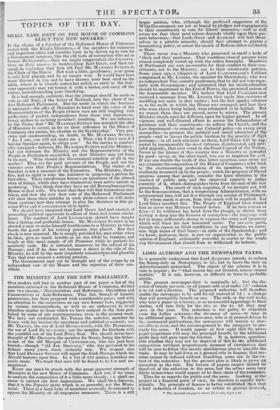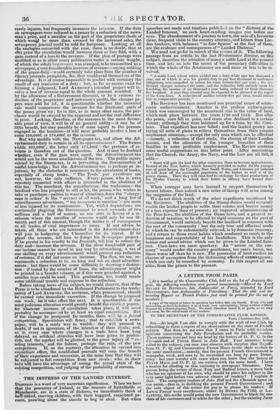LORD ALTHORP AND THE NEWSPAPER TAXES.
IT is generally understood that Lord ALTHORP intends to reduce. . the Stamp-duty on Newspapers to 2d., but to leave the duty on Advertisements untouched. The object of the scheme it is in, vain to inquire ; for" what reason has not dictated, reason cannot ; explain." It is not, however, so difficult to trace its probable ; results.
The present newspaper-duty is nominally 4d.; but the dis--; count of twenty per cent, on all papers sold at or under 7d.5 reduces it to 3d. and a fraction. The proposed reduction will therefore enable the newspaper to be sold for Gd. instead of d. ; a •chatige that will perceptibly benefit no one. The rich, or the well to-do, who take a paper as a luxury, or as-an essential appendage to their . station, will care little for the 26s. or the 4s. 4d. they may • save in the year. The reduction is too paltry to stimulate even the helluo actorum—the devourer of news—to take in an additional paper. To the poor man, who is at present driven to the unstamped publications, the newspaper will remain as inac- cessible as ever, and the encouragement to the smuggler be pre- cisely the same. It would appear at first sight that the news- , paper proprietors will reap the principal benefit, by the additional profit they will gain upon the fraction. It is, however, question- able whether they may not be deprived of this' by the additional , competition (without proportionate increase of cireulation). that will be sure to follow this merely Mischievous plan to unsettle the trade. It may be laid down as,a general rule in finance, that tax- ation cannot be reduced without benefiting sonic one to the ex- . tent of the reduction : but the present plan is likely to prove 'a exception to- the rule. The buyers of papers cannot- indeed-b' ' deprived of the reduction in the price, but the sellers seem very likely to-lose what would appear to be their share of theremission. Thus far as regards the public and the press. Looking at .-the project in a financial point of view, its intention is equally inex- plicable. No principle of finance is 'better established than that . a bold reduction of taxation, on an article in :general' demand.
• The discount on papers above 7d. is only 4 pr cc nt. rarely injures, but frequently increases the revenue. If the duty on newspapers were reduced to a penny by a reduction of the news- tames 'price, and a sacrifice on the part of the proprietors (both of which woulil be more than covered by the Increased sale), the sevenpenny journal could be sold for fourpence. Looking at all the analogies connected with the case, there is no doubt, that at this-ptice- the circulationWould increase three or four fold, with a gain instead of a loss-.0 the revenue. If the plan of postage were MOdified So as to alloW every publication under a certain weight, of which the whole imp ression va stamped, to be transmitted as a newspaper, a. verY.C-onsiderable increase of revenue—saying nothing of, the paper-duty'—would-certainly take place from the number of literary journals, pamphlets, &c. that would avail themselves of the advantage. It is of course impossible to predict with certainty the result of any remission of a duty : but, as far as means exist for forming a judgment, Lord ALTHORP'S intended project will in- volve a loss of revenue equal to the whole amount remitted. If by the 'allowance of a Government discount, or by a ruinous re- daction of the proprietors' and newsmen's profits, the cheaper pa- pers were sold for 5d., it is questionable whether the increased sale would compensate the revenue for the fractional parts of the penny given up ; for in this, as in many other cases, the pur- chaser would be swayed by the apparent and not the real difference in price. Looking, therefore, at the measure in the most favour- able point of view, it will be of no general utility—it can be of little benefit, but may possibly be of some injury to the persons engaged in the business—it will most probably involve a loss of some 160,000/. or 170,000/. to the revenue. Bitt.why meddle with the Newspaper-tax, and allow the Ad- vertisement-duty-to remain in all its oppressiveness? The former yields 483,0001.; the latter only 172,0001.: the pretence of re- wipe is therefore out of the question. And it may be doubted whether, even if the gain were equal, the Advertisement-tax w6uld. not be the more mischievous of the two. The public injury caliSed by the Stamp-tax, is in preventing the dissemination of aeful.knowledge ; but the Advertisement-tax is perhaps as in- juiions,' by the obstacles it interposes to the circulation of books, especially of cheap books. "The Trade" par excellence are ncit, however, the only. sufferers. Every person who is even remotely connected with affairs is interested in the abolition of tins tax. The Merchant, the manufacturer, the tradesman—the landlOrdwho has property to sell or let, the person who wishes to take' or purchase—parties in wantof situations, from the "clergy- roan in orders" V> the "servant of all work," and a long list of miscellaneous advertisers, " too numerous to mention"—are more &less injured by its continuance. Yet, whilst deputations are cOntinually plaguing the Government to remit upwards of two millions and a half of money,. no one stirs in favour of a re- nits skin where the sacrifice of revenue would only be one fif- teenth part of this amount, though the 'matter is of consequence to all trades, of vital importance to many. If our advice be taken, all those who are interested in the Advertisement-duty will join in badgering the Chancellor for its repeal. If he plead the revenue, tell" him to forego his Newspaper project : if he persist in his cruelty to the Journals, tell him to reduce the duty and—increase the revenue. If the three hundredth part of our income cannot be 'saved in any way by retrenching, a tax of one shilling on every advertisement would prevent any reduction Of revenue; if it did' net cause an increase. The Sun, we see; re- 'commends a reduction to Is. on long and 6c1. on short advertise- ment; but there would be some difficulty in draWing a distinc- tion: if tested by the number of lines, the adtertisement might be printed in a broader column, or if this were guarded against, a smaller type could be used. This graduation, too, would create soine'additional trouble and expense in the Collection'. - Before taking leave of the subject, we would observe, that if the Press is to be abandoned by the Reformed Parliament to the tender mercy of Lord ALTHORP, the sentence, when pronounced, should be carriedinto: immediate execution. If the change be proposed ode week,- let .ittake effect the next. It is questionable if the mpst judicious alteration would greatly benefit the exist papers; for Whatever increase of circulation takes place, it will most probably be accompanied by at least an equal competilion. But if the change' be postponed for months, there will be a forced coMpetition. Speculators will fancy, that to eStahIish a news- paPer,'Will be a ready way; to ' wealth : they will proceed in doubt,-if not hi.ignorance, of the intention of their "rivals; and, as in every case where changes in a trade. have been long delayed, an artificial, stimulus will have been given to produc- t* and the market will be glutted, to the great injury of " ex- isting interests,' and the failure, perhaps the ruin, of the new coMpetitors. If, on the Centrary, the' alteratipn be carried into inimediate effect, the established journals will reap the, benefit of 'their experience and connexion, at the same time that they will be-s.ubjeeted to full Competition from' new . rivals ; who in their tuill_Wilt have the advantage . of seeing the actual state of the



















 Previous page
Previous page